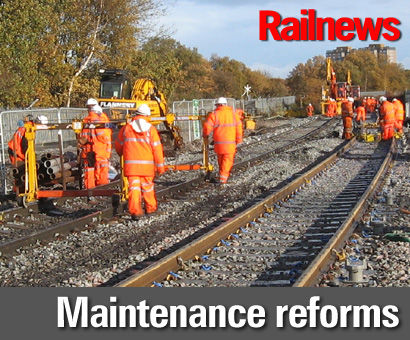TRANSPORT secretary Chris Grayling has told Railnews his reforms of railway maintenance, to be formally unveiled later today, are intended to get people around the same table rather than 'throwing contracts at each other'.
In a speech to the think tank Policy Exchange this evening, he will spell out plans to make franchised operators more responsible for infrastructure maintenance.
However, speaking in advance of the event, he dismissed any idea that Network Rail will be 'stripped of its powers', as some early reports had claimed. Although there will be greater devolution to the individual routes, management of the infrastructure will remain with Network Rail.
He will tell his audience: "We will establish 'East West Rail', a new and separate organisation to Network Rail. It will lead to the creation of Britain's first new integrated rail operation for decades.
"For example; the new franchises due to be let on South Eastern and East Midlands will be an integrated operating team between train services and infrastructure.
"Our railway is much better run by one joined up team of people. They don't have to work for the same company. They do have to work in the same team. We want to see closer working across the industry, to resolve problems more quickly -- putting the needs of the passenger first."
Mr Grayling is using the experience already gained within Network Rail Alliances to build his new organisations. The 'deep' Alliances are the closest model, but in future operators will play a greater part in maintaining the railway they use.
He explained to Railnews: "Look at Crossrail today, Crossrail is made up of a variety of people from different organisations working together as a team. I am trying to get away from a position where if something goes wrong people people throw contracts at each other rather than working together to sort it."
He has also dismissed the prospect of returning Network Rail to the private sector, saying: "I am not breaking up Network Rail to privatise it. We have a railway that is bursting at the seams and facing challenges. One of the challenges facing Network Rail and the operators is planning around each other, so I think you will get broader efficiency. I think the real benefit is a railway that is more responsive to consumer needs, better at responding to challenges. My basic premise is that we have a railway that is bursting at the seams, that is facing some real challenges, as a result of the scale of growth in passengers.
"There are only two ways you can respond to that. One is by increasing capacity, which we're doing in a number of ways, ranging from Crossrail to longer trains on South Western and by building the Ordsall Chord in Manchester. The other is to create something which operates more efficiently and more effectively."
Network Rail chief executive Mark Carne has 'strongly welcomed' the new approach.
He said: “We have already devolved Network Rail into route-based businesses closer to customers, and the proposals announced today will build on the alliances we have created between these route businesses and train operators. We also strongly believe there should be better alignment of incentives between train companies and Network Rail. That is why we now align the performance incentives for all of Network Rail’s 35,000 staff, around targets agreed jointly with train operators. But more needs to be done across the industry.
“Network Rail’s published transformation plan is moving us to being a public sector body that acts like a private business, with a clear focus on what customers want.”
“Competition must be at the heart of any organisation that wants to behave like a private sector business. Competition breeds efficiency and innovation and will further encourage our own teams to push aside the barriers holding them back. That is also why I announced last month that Professor Peter Hansford will chair an independent review into the barriers to competition in all elements of delivering rail engineering projects.”
Mark Carne has already announced the creation of Boards for each of the devolved route businesses, involving passenger representatives, and these boards will oversee the running of the railway in their areas.
However, the reforms have concerned the RMT. The union's general secretary Mick Cash said: "There is no question at all that this plan represents the piecemeal privatisation of Network Rail which over a period of time will see both train operations and track run by the same bunch of companies who have failed so abysmally over the past two decades.
“The idea that what Britain’s railways need is more privatisation is ludicrous. The introduction of the profit motive into infrastructure raises again the spectre of Hatfield and Potters Bar."


